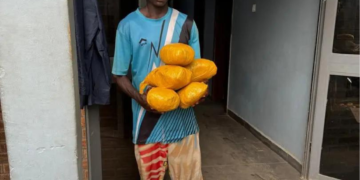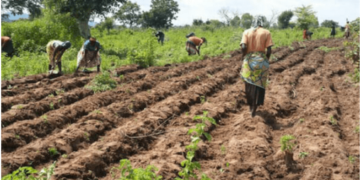The next Africa Cup of Nations will be played in Morocco from December 21, 2025, to January 18, 2026, as announced by the Confederation of African Football (CAF) president Patrice Motsepe on Friday.
“I am confident that the CAF AFCON Morocco 2025 will be extremely successful and the best AFCON in the history of this competition,” he said, expressing his optimism about the upcoming event.
CAF held a virtual executive committee meeting at their headquarters in Cairo on Friday evening, after which Motsepe made the announcement. This decision came after careful consideration and planning by the CAF officials.
Originally scheduled for June and July 2025, the AFCON was moved to avoid a clash with the inaugural Club World Cup in the United States, which is set to take place from June 15 to July 13 next year. This rescheduling was necessary to ensure that the AFCON could be held without any conflicts with other major football events.
An added challenge for CAF officials was the desire to avoid a clash of dates with the UEFA Champions League in Europe. Matchday six of the elite European club competition ends on December 11, 2025, and matchday seven begins on January 21, 2026. This careful planning was essential to ensure that the AFCON could be held without any disruptions to the European football calendar.
However, the new dates are sure to upset many Premier League clubs, as the Christmas-New Year period is frenetic with teams playing many matches in a short period. This scheduling conflict could lead to tensions between CAF and the Premier League clubs, as they may be reluctant to release their African players for the tournament.
English media reports have suggested that clubs might not release African stars, as they are compelled to do so for only one international championship per year, and the next World Cup is in 2026. This potential conflict could lead to further discussions and negotiations between CAF and the clubs to ensure that the players can participate in the AFCON without any issues.
CAF could argue that it is the 2025 AFCON, although most of the tournament will be staged the following year. This distinction could be crucial in the discussions with the clubs, as it may help to clarify the scheduling and participation requirements for the players.
Finding suitable dates for the AFCON, a 24-nation tournament won by hosts the Ivory Coast last February, has become increasingly difficult. The complexities of scheduling such a large and prestigious event require careful planning and coordination with other football organizations and competitions.
A switch to mid-year worked for the 2019 edition in the searing heat of Egypt, as it avoided a clash with the European club seasons. This successful scheduling demonstrated the importance of finding the right dates to ensure the smooth running of the tournament.
Dramatic profit increase
However, the two subsequent editions, in Cameroon and the Ivory Coast, had to be staged in January and February to avoid the rainy seasons in central and west Africa. This adjustment was necessary to ensure that the matches could be played in optimal conditions, avoiding the disruptions caused by heavy rains.
The qualifying draw for the 2025 AFCON is scheduled for Johannesburg on July 4, with 48 hopefuls to be divided into 12 groups. This draw will set the stage for the teams to compete for a place in the prestigious tournament.
Morocco will take part to gain competitive match practice, but they are guaranteed a place at the 24-team finals as hosts. This participation will help the Moroccan team to prepare for the tournament and ensure that they are in top form for the competition.
Unlike the four-yearly European Championship, Copa America, and Asian Cup, the AFCON is held every two years because it delivers most of the CAF revenue. This frequent scheduling is essential for the financial stability and growth of the organization.
In a recent TV interview, Motsepe said CAF made an $80 million (€75 million) profit from the last AFCON, hosted by the Ivory Coast in January and February this year. This was a dramatic increase from previous editions, which produced an average profit of about four million dollars, according to the South African billionaire. This significant profit highlights the importance of the AFCON for the financial health of CAF.
The 2024 Women’s AFCON (WAFCON) has also been postponed and will now be played in Morocco from July 5-26 next year. This rescheduling was necessary to ensure that the tournament could be held without any conflicts with other major events.
New dates will also have to be found for the African Nations Championship (CHAN), originally scheduled for Kenya, Tanzania, and Uganda this year. This tournament, which is restricted to home-based footballers, has faced delays and challenges in finding suitable dates.
Not even the qualifying draw has been made for a competition restricted to home-based footballers and won by Senegal in Algeria last year, and CAF have not explained the delay. This lack of communication has led to uncertainty and speculation about the future of the tournament.
There has also been no news from CAF on a second edition of the African Football League (AFL), initially called the African Super League. This competition, which was planned to be a 24-club mini-league and knockout competition featuring the highest-ranked clubs on the continent, has faced challenges in its implementation.
Planned to be a 24-club mini-league and knockout competition featuring the highest-ranked clubs on the continent, it debuted last year with just eight sides involved in a three-round affair. This limited participation highlighted the challenges of organizing such a large and complex competition.
Were the original format to be introduced, clubs would play between 14 and 21 matches in a continent where air travel presents challenges due to limited direct flights between countries. This logistical challenge is a significant factor in the planning and execution of the tournament.
“You can turn the lights off on domestic football if this (AFL) goes ahead,” warned John Comitis, the chairman of top-flight South African club Cape Town City. This statement underscores the potential impact of the AFL on domestic football leagues and the need for careful planning and coordination to ensure that all competitions can coexist successfully.
























